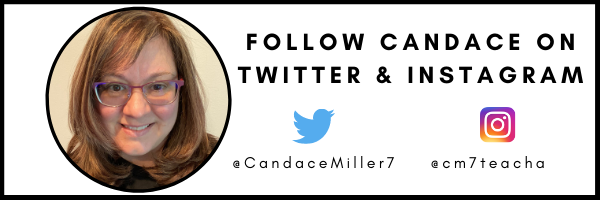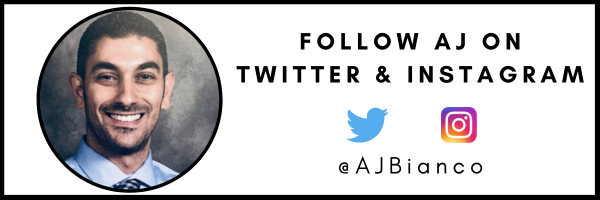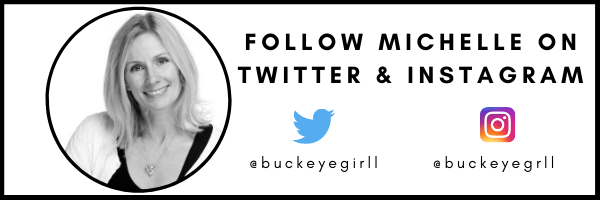TL;DR:
- This is a collaboratively written post. Check out the different stories by 7 educational leaders on new perspectives.
- What causes us to change our perspective? What perspectives do students walk into class with and how do we change their perspective?
- What’s your why? Has it changed? Keep reminding yourself of your why.
- Help prepare each student. Make school a place where they want to be.
- Continue to develop relationships and seek to understand students’ different perspectives.
Alex T. Valencic: A New Way of Seeing
As a young child, my world was blurry. I sat as close to the TV as my parents would allow me. I still just saw blurry colours moving around on the screen. Billboards and signs along streets and highways were just brief flashes of colour. Faces were not nearly as recognizable as voices. It was all I knew, and so I didn’t realize that anything was amiss.
That is, until the day my mum had me try on my brother’s glasses. I suddenly discovered that there were words on the laundry detergent bottle across the room. On my way home from the eye doctor’s office with my first pair of glasses, I oohed and aahed at the words that I could suddenly see. My world had completely changed with this new way of seeing, a new perspective.
Candace Miller: What perspectives do students have?
A new perspective that opened a lens to a new world. As I reflect on the many times life has thrown me into new experiences that have changed my outlook on life, I am reminded of the one that has had the biggest impact on who I am now as an educator and life-long learner.
I was jumping back into education after taking ten years away to raise my son. My new role would be in a sheltered science class teaching English Language Learners. It was during these four years of teaching that I learned who I am as a teacher. I also learned so much about the world and other cultures. My lens, which was so narrow, has now been broadened. All I had to do was slow down, listen to my students, have an open mind, and be an active participant in what my students could teach me.
This got me thinking about the perspectives our students walk into class with.
We must also acknowledge that growth often changes our perspectives and therefore, it is important to challenge and reevaluate our why from time to time. Share on XCarrie LaRue: Help prepare each student.
Our small, rural community has little diversity in ways of ethnicity, but a multitude of differences in how their families view education. We have families in generational poverty. Some families have owned the same business for years. We have families who loudly proclaim the need for their students to be ready for D1 universities while others just hope their student makes it through high school.
It’s our job to prepare “each” of these students. We have to help each student understand the role of education in their lives. This is a huge challenge. What classes do we need to offer? What programs need expanding? How can we work with community partners? And, as difficult as it can be, how do we help some students change the educational perspective with which they enter our buildings?
AJ Bianco: What was your original WHY?
From a young age, I saw myself becoming an educator. I knew that I wanted to work with kids and help them in a variety of ways. Whether it was in the classroom, on the field, or in life, I held onto this vision of what the future ahead of me was like, and others saw it as well. This vision morphed over the years, moving from classroom teacher to school leadership, but I always knew that whatever the role, it was for the kids. This is something that I hold onto each day I walk into the building, and with every decision that I make on a given day.
To make schools more student-focused, educators need to find ways to allow students more freedom and more chances to find enjoyment in how they learn. It’s something that needs to be said: the content we teach is something that we do in schools, but it isn’t the only thing we do. We need to remember that education is for the children first.
When we take a step back and look at what our goal actually is, we can clearly see that school, and the idea of school, is to prepare our students for the world around them.
It is our responsibility to help them be creative, collaborate with those around them (even those they don’t like), learn important skills, and think critically to solve problems. The content will help them get there, but we are the ones that should coach them up and lead students in the appropriate direction.
In education, it’s extremely important that we continue to keep our eye on the prize. We need to make sure we hold on to the vision that we once had when we started our journey. Education is changing each and every year, some things are fantastic, while other changes are miserable. I challenge you to take a step back and focus on your original WHY. What was your vision when you said you wanted to teach? Where did you see yourself as your career evolved? How can you continue to make the necessary changes for students and schools for the next generation to improve on? Let’s all open our eyes and focus on the positives around us. Hold on to our vision and make school a place that students WANT to come to each day.
Raymond Porten: Look at perspectives that helped mold your why.
“I challenge you to take a step back and focus on your original WHY.” That challenge is so important!!! Often our “why” is driven by our perspectives. Some perspectives we are aware of and hold close, such as who or why we are what we are. For example, growing up, my dad was the hardest-working man I knew. He was a carpenter who wore his body out daily to provide for our family. When I got to work with him for a summer job, he would wear me out, too. Every day he would ask me while we drove home, “Are you going to college?”
He helped build the perspective in me that education was so important! But there were other perspectives he helped me form that I wasn’t as aware of. Perspectives like the value of hard work, loyalty, and dedication. These were values he may not have talked about but through his actions, he molded perspectives I still value today. So when stepping back and focusing on our why, we need to look at the perspectives that helped mold our why, too.
[scroll down to keep reading]Michelle Kasun: Reevaluate your why.
I was recently awestruck by this quote from Michael Jr. “When you know your why, your what has more impact, because you are walking in or towards your purpose.”
Wow! I’ve been marinating on this for days now. Of course, it makes so much sense but for some reason, the way Michael Jr. worded this—or maybe it was the impact of the Amazing Grace example in his Know Your Why video—has really opened my eyes to the different perspectives of my why. Honestly, this post-COVID school year has me questioning a lot of things. Why am I still in the classroom? What is it about education that keeps me in the game? Am I still walking in or towards my original purpose or has that evolved? Do I really want to dip my toe into education leadership? Is my what still making any impact, or has my what changed so that my impact just looks different?
As educators, we know how important growth is. We must also acknowledge that growth often changes our perspectives and therefore, it is important to challenge and reevaluate our why from time to time. It certainly all comes down to ‘each’ student and many different perspectives will impact each scholar. So, l am acknowledging the necessity to reevaluate my why so that my what remains only a positive impact on each student, family, AND educator with whom I cross paths.
Mark Horner: Remember your calling.
Establish relationships, inspire people, impact lives…the three main components of my WHY. I think daily about these three core values I cling to. In retrospect, I see how these three ideas were instilled in me by my parents and how they demonstrated servant leadership all throughout my life. I am thankful for their influence. Daily, in my new role as an assistant principal, I think about the value of a supportive family at home and a supportive team at school. Our kids come from so many different backgrounds and situations that it is essential that we as educators surround them with love and support.
Over the past week, I have been asked by multiple students if I would give them a hug. Yesterday a 6’6” giant of a student asked me, after a very difficult conversation, if I would hug him. This challenged me, even more, to keep reminding myself of my WHY. It is to continue to develop those relationships and seek to understand our students’ different perspectives, and never forget the privilege of our calling.
WE make eternal differences daily. YOU make eternal differences daily.
About Alex T. Valencic
Alex Valencic is an educator, former small business owner, Boy Scout, volunteer drug prevention specialist, unrepentant bibliophile, and a geek of all things. He worked as a substitute teacher for three years before achieving his lifelong dream of teaching fourth grade, which he did for seven years in Urbana, Illinois, before accepting his current position as the Curriculum Coordinator for 21st Century Teaching and Learning in Freeport, Illinois, where he not only supports innovative educational practices in the classroom but also oversees social studies, science, and nearly all of the elective courses in the district.

About Candace Miller
Candace Miller is an educator who believes that each student is capable of learning. She understands that connecting with students is key. Her passion is helping students with basic needs. Candace orchestrated the set up of a care corner in her school where students can go and shop for free items that they need. Her other passions include her family, camping, being in nature, reading and crafting (mainly using her cricut machine).
Candace started her education career in Lansing, Michigan. She took ten years away from education to be a stay at home mom for her son. Candace is currently teaching high school science in the Columbus area of Ohio where she is part of her school’s teacher leadership program. She previously taught ESL science in a sheltered science class. Candace is honored to be a founding ambassador for the Teach Better Family and is excited to collaborate with others in the Teach Better Family to be a better teacher.

About Carrie LaRue
Carrie LaRue is a second-career teacher at Royster Middle School in Southeast Kansas, where she has the privilege of instructing 8th graders in reading and writing. After a short stint in journalism, she returned to college to earn a certification in education and went on to earn a Master’s in Literacy from the University of Missouri. She is passionate about creating strong relationships with students (#reachbeforeteach) and their families. Her students know she loves to read, cook, travel, and do counted cross-stitch when she isn’t teaching them.

About AJ Bianco
AJ Bianco is a husband, father of three, and Assistant Principal in New Jersey. AJ takes pride in coaching teachers to help them and their students excel to their greatest potential. He is an advocate for technology tools and methodologies in the classroom and is a proponent of Blended Learning practices, Personalized Learning, Project-Based Learning, and the Flipped Classroom model to enhance student learning.
AJ is an avid podcast listener, host of the ReflectEd Podcast, co-host of PodcastPD. AJ shares his passion for education, and leadership through his website and podcast at www.ajbianco.me. Connect with AJ on all social media, @AJBianco.
About Raymond Porten
Raymond Porten is a husband to an AMAZING wife, parent to two wonderful boys, a principal of an elementary school in northern Illinois, and a Golden Apple Scholar. He spends his free time traveling with his family, cooking with his boys, and he finds the time to co-host two podcasts. He’s been in education for 20 years and has worked as a 5th grade teacher, middle school dean, 7th and 8th grade social studies teacher, middle school assistant principal, and now serves as a principal. He believes in the importance of building relationships and taking every opportunity to lead and make a difference in the world.
About Michelle Kasun
Michelle Kasun is an educator who takes her responsibility of molding young minds very seriously. She has had the privilege of teaching many different subjects for grades 3-12 but just recently relocated from Oregon to Montana where she is finally teaching the age and subjects she is most passionate about – middle school ELA and SS.
Michelle is proud to be a founding Teach Better Ambassador. She is currently pursuing National Board Certification in Early Adolescence ELA and is also a certified fitness instructor. When she is not geeking out on all things education, she enjoys horses, hiking, group exercise and family time.
About Mark Horner
Mark Horner is a proud husband and father. He has been married to his college sweetheart, Jennifer for over 20 years. They have two children: Kelsie, current aspiring teacher at Kent State University and a son, Noah, a student at Tallmadge High School, Tallmadge, Ohio. Mark received his undergraduate degree from the University of Akron, and his Master’s in K-12 Leadership from Kent State University.
He’s spent his entire teaching career within Tallmadge City Schools. He student taught at the MS, and then stayed on for 5 years as an 8th grade American History teacher. He was then moved to the HS where he has been teaching US History and Psychology for a lot of years! When not in the classroom you can either find him on a basketball court coaching basketball, at Crimson Cup drinking coffee and reading a good book, or walking his Golden Retriever, Teddy, (yep, named after President #26) around town.
Mark is an aspiring blogger and podcaster. You can check out his writing at https://horner.school.blog/ and his podcast, #Between2BlueDevils, at https://anchor.fm/mark-horner, or on any other podcasting platform.






